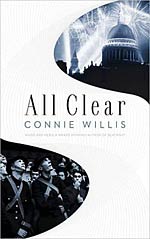
![]() imnotsusan
imnotsusan
4/30/2022
![]()
I can grudgingly understand why these books have been popular with readers who have a certain sense of humor or tolerance for poor pacing that I myself do noth ave. I think these review, borrwoed from the Wikipedia entry for Blackout/All Clear, basically sum up my feelings about these books - I really couldn't have said it better:
Christopher DeFilippis, writing for the SF Site, said he thought the books "can best be described by words like 'belabored' and 'exasperating.' That's because the single story told in Blackout and All Clear didn't have to encompass two novels. Had it not been marred by endlessly repetitive prose and character actions, the narrative could have fit neatly into a single volume... Unfortunately, the bulk of Blackout is taken up by Polly, Mike and Eileen's individual realizations that they're trapped in the past, with each caught in a state of seemingly perpetual denial about their circumstances. Instead of acknowledging the blatant truth of their predicament, they concoct endless mental scenarios as to why their gates won't open... Willis goes on for pages with her protagonists repeatedly ruminating about the same "what ifs" over and over (and over) again. It may be understandable in the beginning of the story as the characters adjust to the magnitude of their situation. But it soon becomes apparent that this is what constitutes drama in Willis' universe and it never stops...."
Similarly, Adam Roberts of The Guardian wrote, "The result is a mildly interesting 200-page novel about the ordinary heroism of British civilians during the war, bloated to 800 pages via an egregiously handled time-travel conceit, eked out with great jellied quantities of historical research, endless meandering conversations, long passages disposed into that tiresome typographical convention by which characters' inmost thoughts are spelled out in italics, and a string of inconsequential chapter-end cliffhangers/immediate resolutions that got increasingly on my nerves as the book went on. There's little overall tension, and the time-travelling historians come over as both panicky and amateurish -- an undesirable combination, one might think, where timelines are lying about ready to be mucked up."